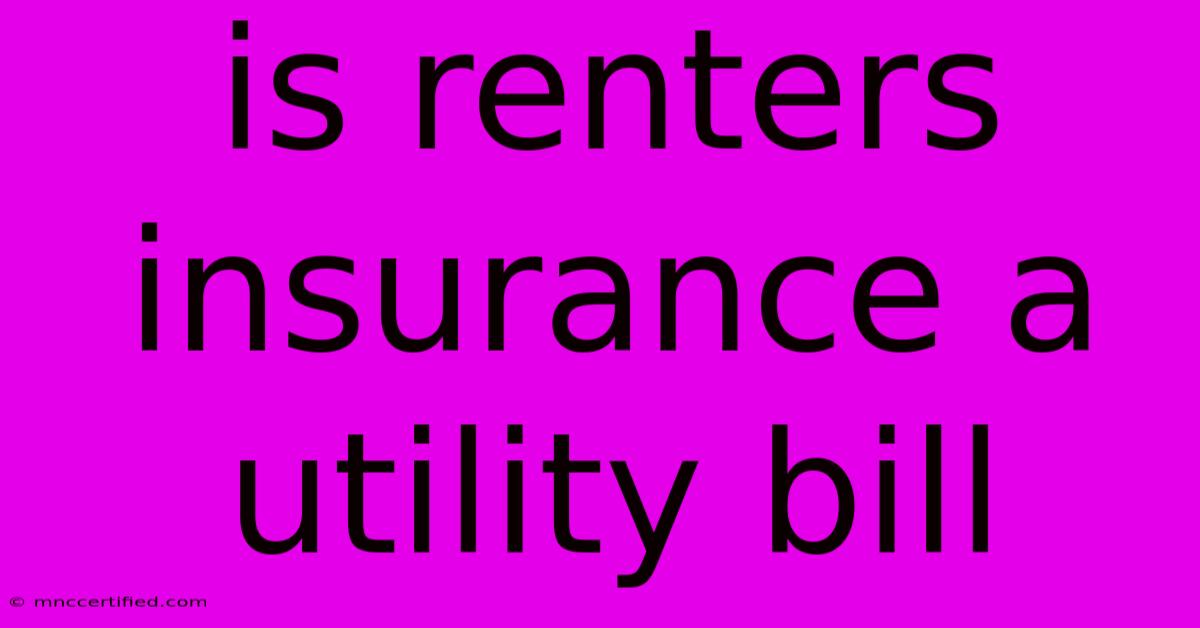Is Renters Insurance A Utility Bill

Table of Contents
Is Renters Insurance a Utility Bill? Decoding the Difference
Renters insurance is a crucial safety net for tenants, offering protection against financial losses from unexpected events like fire, theft, or natural disasters. But many people wonder: is renters insurance a utility bill? The answer, unfortunately, isn't as straightforward as you might think.
Let's break down the key differences:
What is a Utility Bill?
Utility bills are recurring expenses for essential services that make your home habitable. These typically include:
- Electricity: Powering your appliances and lighting.
- Water: Providing water for drinking, sanitation, and household use.
- Gas: Fueling your heating system, stove, or water heater.
- Trash/Recycling: Waste disposal and recycling services.
- Internet/Cable: Access to internet and television services.
What is Renters Insurance?
Renters insurance, on the other hand, is not a utility bill. It's a contract you purchase from an insurance company to protect your personal belongings and financial liability.
Here's a closer look at what it covers:
- Personal Property: It covers the cost of replacing or repairing your belongings if they're damaged or stolen, including furniture, electronics, clothing, and more.
- Liability Coverage: Protects you if someone gets injured on your property and files a claim against you.
- Additional Living Expenses: If you're unable to live in your apartment due to a covered event, renters insurance can help cover the cost of temporary housing, food, and other essentials.
Why the Confusion?
The confusion often arises because both renters insurance and utility bills are recurring expenses. However, the nature and purpose of these costs are fundamentally different.
Utility bills are essential for maintaining your living space, while renters insurance provides financial protection in case of unforeseen events.
Importance of Understanding the Difference
Knowing the difference between renters insurance and utility bills is vital for several reasons:
- Budgeting: You need to factor in both types of expenses when planning your monthly budget.
- Negotiations: Understanding the difference between essential utilities and optional insurance can help you during negotiations with landlords or potential roommates.
- Avoiding Confusion: Differentiating these costs can prevent misunderstandings when dealing with financial institutions or service providers.
Conclusion
Renters insurance is not a utility bill. While both are recurring expenses, their purpose and nature are entirely different. It's crucial to understand this distinction to ensure you have adequate financial protection and avoid any confusion related to your housing costs.

Thank you for visiting our website wich cover about Is Renters Insurance A Utility Bill. We hope the information provided has been useful to you. Feel free to contact us if you have any questions or need further assistance. See you next time and dont miss to bookmark.
Featured Posts
-
Nba 2024 Lakers Vs Grizzlies Game Preview
Nov 14, 2024
-
India Vs South Africa 3rd T20 I Match Summary
Nov 14, 2024
-
Start Real Estate Investment Company
Nov 14, 2024
-
Napoli Property Investments Limited
Nov 14, 2024
-
Support Pangolin Pups This Giving Tuesday
Nov 14, 2024